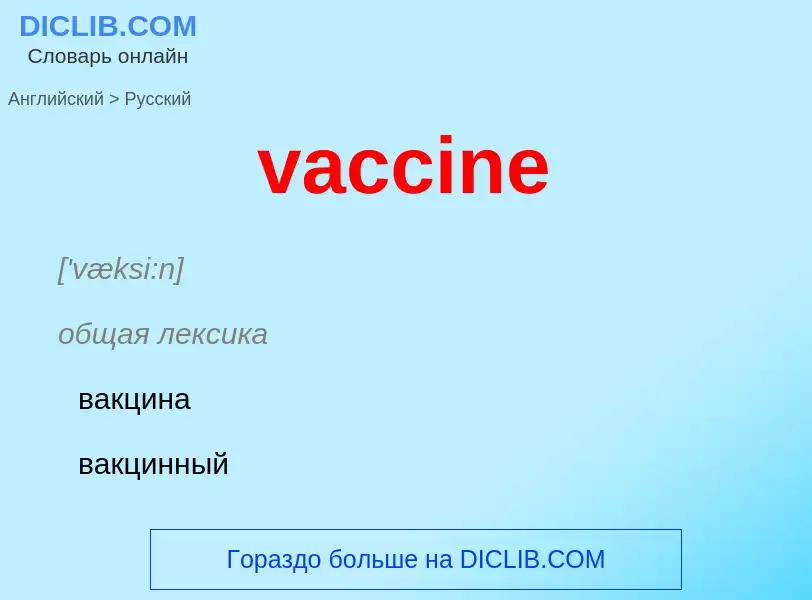Traduction et analyse de mots par intelligence artificielle ChatGPT
Sur cette page, vous pouvez obtenir une analyse détaillée d'un mot ou d'une phrase, réalisée à l'aide de la meilleure technologie d'intelligence artificielle à ce jour:
- comment le mot est utilisé
- fréquence d'utilisation
- il est utilisé plus souvent dans le discours oral ou écrit
- options de traduction de mots
- exemples d'utilisation (plusieurs phrases avec traduction)
- étymologie
vaccine - traduction vers russe
['væksi:n]
общая лексика
вакцина
вакцинный
"вакцина"
программа, обеспечивающая защиту против вирусов дополнительной проверкой целостности операционной системы
синоним
прилагательное
общая лексика
вакцинный
вакцинальный
медицина
относящийся к прививке оспы
ветеринария
относящийся к коровьей оспе
редкое выражение
коровий
существительное
['væksi:n]
медицина
вакцина
вакцинный
Définition
Wikipédia

A vaccine is a biological preparation that provides active acquired immunity to a particular infectious or malignant disease. The safety and effectiveness of vaccines has been widely studied and verified. A vaccine typically contains an agent that resembles a disease-causing microorganism and is often made from weakened or killed forms of the microbe, its toxins, or one of its surface proteins. The agent stimulates the body's immune system to recognize the agent as a threat, destroy it, and to further recognize and destroy any of the microorganisms associated with that agent that it may encounter in the future.
Vaccines can be prophylactic (to prevent or ameliorate the effects of a future infection by a natural or "wild" pathogen), or therapeutic (to fight a disease that has already occurred, such as cancer). Some vaccines offer full sterilizing immunity, in which infection is prevented completely.
The administration of vaccines is called vaccination. Vaccination is the most effective method of preventing infectious diseases; widespread immunity due to vaccination is largely responsible for the worldwide eradication of smallpox and the restriction of diseases such as polio, measles, and tetanus from much of the world. The World Health Organization (WHO) reports that licensed vaccines are currently available for twenty-five different preventable infections.
The folk practice of inoculation against smallpox was brought from Turkey to Britain in 1721 by Lady Mary Wortley Montagu. The terms vaccine and vaccination are derived from Variolae vaccinae (smallpox of the cow), the term devised by Edward Jenner (who both developed the concept of vaccines and created the first vaccine) to denote cowpox. He used the phrase in 1798 for the long title of his Inquiry into the Variolae vaccinae Known as the Cow Pox, in which he described the protective effect of cowpox against smallpox. In 1881, to honor Jenner, Louis Pasteur proposed that the terms should be extended to cover the new protective inoculations then being developed. The science of vaccine development and production is termed vaccinology.




![Comparison of [[smallpox]] (left) and [[cowpox]] [[inoculation]]s sixteen days after administration (1802) Comparison of [[smallpox]] (left) and [[cowpox]] [[inoculation]]s sixteen days after administration (1802)](https://commons.wikimedia.org/wiki/Special:FilePath/Inoculation day 16.png?width=200)
![An early 19th-century satire of antivaxxers by [[Isaac Cruikshank]] An early 19th-century satire of antivaxxers by [[Isaac Cruikshank]]](https://commons.wikimedia.org/wiki/Special:FilePath/Jenner and his two colleagues seeing off three anti-vaccinat Wellcome V0011075.jpg?width=200)



![Goat vaccination against [[sheep pox]] and [[pleural pneumonia]] Goat vaccination against [[sheep pox]] and [[pleural pneumonia]]](https://commons.wikimedia.org/wiki/Special:FilePath/US Navy 060815-N-0411D-018 U.S. Army Veterinarian, Capt Gwynne Kinley of Cape Elizabeth, Maine, immunizes a goat with the help of U.S. Navy Operations Specialist 2nd Class Jessica Silva.jpg?width=200)


![<!--[[wp:caption]] "Not every image ..."--> <!--[[wp:caption]] "Not every image ..."-->](https://commons.wikimedia.org/wiki/Special:FilePath/WHO EN Vaccines Topics Race for a COVID-19 vaccine 01 12Jan2021.jpg?width=200)
